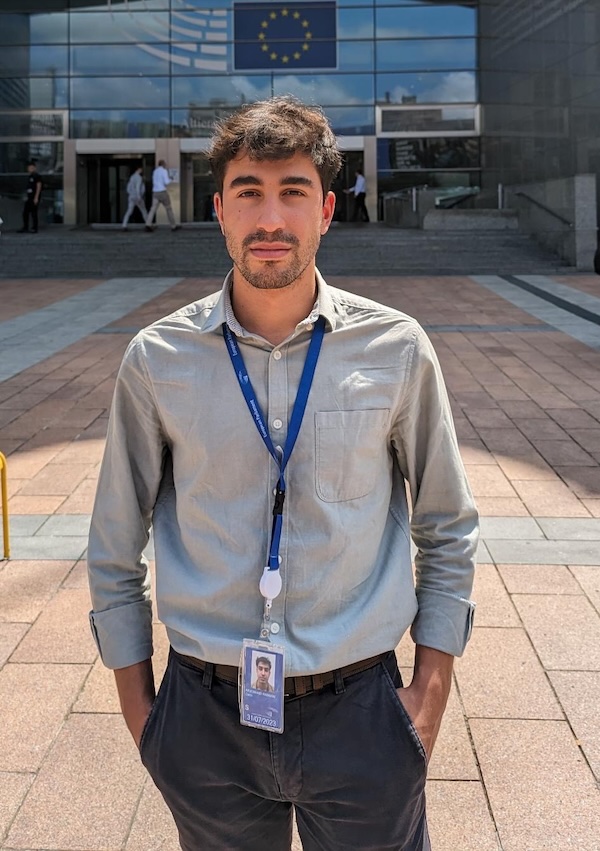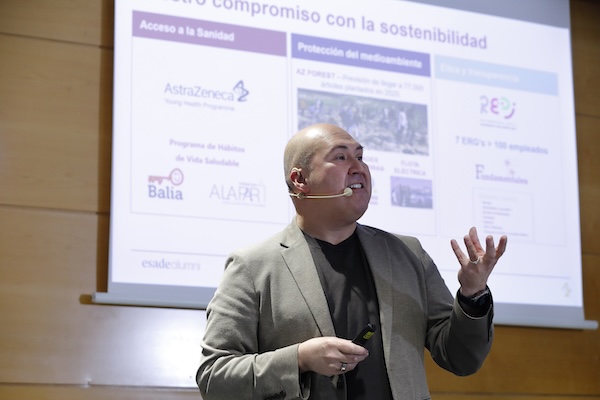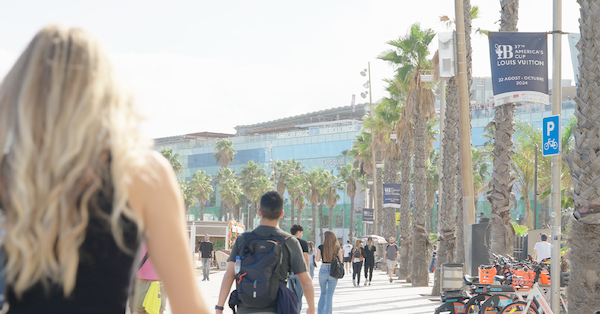Darío Arjomendi is a researcher at EsadeGeo and a board member of the Esade Alumni Global Governance Club
His deep-seated passion for international politics, inspired by his family history, motivated Darío Arjomendi to become part of the first graduating class of the BBA in Global Governance. This program transformed the way he saw the world, a perspective he applies today as a researcher at EsadeGeo. His work with the Cercle d’Economia, the Equipo Europa, and the Global Governance Forum broadens his understanding of global challenges, as does his work on the board of the Esade Alumni Global Governance Club.
 - Could you tell us what led you to choose Esade’s BBA in Global Governance? What attracted you to this program in particular?
- Could you tell us what led you to choose Esade’s BBA in Global Governance? What attracted you to this program in particular?
I have always loved international politics. As the child of an Iranian and Baha’i family who went into exile in Spain after the revolution, I have had a family connection with many global causes: human rights, socioeconomic development, world peace, and all the others.
And then I discovered the Bachelor in Global Governance, Economics, and Legal Order. I was smitten. I remember that I was in my second year of baccalaureate, trying to find my mission in life, and I attended a masterclass taught by professor Jordi Molina. He began with a phrase I’ll never forget: “There are times of change and changes of times. We are living in the latter.” And at that moment I realized that this field of study combined all my personal, vocational, and intellectual passions. And I became a proud member of the first graduating class of this Bachelor’s degree [until then it existed with Law].
- How did the program’s global approach influence your professional and personal perspective?
It radically influenced them. It changed the way I see the world. When you are educated in this international atmosphere [he had classmates from all continents], it profoundly transforms your vision of the world. It allows you to see what “humanity” means and to learn about the reality of our “world.” And if you are able to cultivate this vision and global awareness, it also changes your life. It makes you committed to what’s happening on the rest of the planet; it equips you with the capacity for abstraction and an understanding of large-scale trends. And this is very useful in understanding the particular, the immediate, the nearby. Although we should not forget that action is local. Think globally, act locally!
Now, I want to stress that this global vision is blind if we are not seriously committed to the causes and problems beyond our borders, with inequalities, conflicts, climate changes, etc.
- You recently began to work with EsadeGeo as a researcher. Could you explain what this collaboration is about and what project you’re currently working on?
That’s right, I joined it as a research assistant. EsadeGeo is a benchmark think tank in Spain that studies geopolitical and global economic trends. Its president is Javier Solana, and it’s managed by Ángel Saz. I primarily work with the Observatory of European Industrial Policy, which monitors all the European legislative activity on this matter (it’s a topic on everyone’s agenda). We produce reports, opinions, and analyses, and we open up spaces of reflection and knowledge for economic/industrial stakeholders and the public or regulatory institutions involved. Industry is a source of technology, development, and progress, but how can Europe re-industrialize while continuing to accelerate its urgently-needed decarbonization? And how can it create a European defense strategy without rearming futilely? These are very pressing questions today, and they’re not easy to answer. Analysis is part of the decision-making chain. And then you have to reach a consensus and put it into practice (which is the most difficult part).
- You also work with the Cercle d’Economia, the Equipo Europa, and the Global Governance Forum. How do these experiences influence your perspective on today’s economic and social challenges?
I have occasionally worked with the team at the Cercle d’Economia that develops the program for the famous Annual Meeting, which is targeted at getting economic stakeholders, experts, and public figures to debate today’s challenges. It’s a really unique experience to see the public figures and decisive stakeholders talking about inequality, competitiveness, defense and security, climate, technology, multilateralism and other issues. But my impression is that politicians have to be less political and put what the experts say into practice. And experts have to be committed to their causes on a practical level. And businesspeople should (and can) do more for the common good. Intellectual effort is worthless if it doesn’t lead to a social commitment. For example, inequality is not solved by talking or theorizing; it’s solved by legislating, providing jobs, promoting education, redistributing. That commitment to action (and sacrificing one’s private interest) is pretty weak today at all levels. I encourage you to read the Cercle d’Economia’s notes; they are an example of intellectualism and objective analysis targeted at offering practical solutions to social problems. They are touchstones.
The Global Governance Forum is an international think tank that also aims to make constructive proposals for global governance problems (as we call them). It recently published a second United Nations Charter! It is a completely remade charter adapted to today’s world (the original is eighty years old). It works with the top experts in these fields. It has a global parliamentary assembly, international tax resources, a security council with members from all continents, an International Court of Justice with compulsory jurisdiction. In short, it’s crazy. And so worth defending. I encourage you to read it. And it’s an honor being a research assistant and even modestly associated with this effort.
- What are your short- and middle-term professional goals?
My project is Europe. And my causes are to lower global economic inequality and encourage humanity’s unity. Wherever I can best work towards those goals, that’s where I’ll have to go. In practical terms, I want to continue to educate myself and then work as an EU public servant. I think I can make a positive contribution to the EU institutions.
- From your position on the board of the Global Governance Club, what are the main goals and activities you’re currently promoting?
I am a board member. Our beloved academic sponsor, an illustrious member of Esade and the driving force behind the club, is professor Miguel Trías. The club is new (it’s only been around for one academic year), and we’ve held two high-quality events with great attendance. The first was on the elections in the United States and the second was on the geopolitics of energy. We are a very young board that’s connected to the world, to the vibrant alumni community, and to current students (and future alumni). This next academic year is going to be super-busy! I encourage you to join it and keep abreast of our news and events. The club aims to bring the international situation to the alumni community and to open up relaxed, safe spaces of reflection and debate with people who know what they’re talking about.
- What does it mean to you to be part of Esade Alumni as a global community? How do you think this network can benefit from your career path?
I find it exciting. Continuing to be a part of and connected to Esade Alumni means staying connected to my alma mater. The university, as a human community of knowledge and contribution, should never end. And that’s why the alumni association exists. It’s also a great way to meet people, pursue further training, and stay on top of what is happening at the university.

 - Could you tell us what led you to choose Esade’s BBA in Global Governance? What attracted you to this program in particular?
- Could you tell us what led you to choose Esade’s BBA in Global Governance? What attracted you to this program in particular?


















